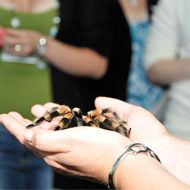
Europe's first walk-through spider enclosure to open in London
Europe's first walk-through spider enclosure is set to open at ZSL London Zoo in a bid to change people's perspective of the arachnid.
Opening on Saturday, 23 May 'In with the spiders' will bring the public face-to-face with amazing spiders from around the world in a completely unique and immersive experience.
Visitors will first get acquainted with the UK native species and regular house guest 'spider in a bathtub', before meeting captivating and exotic species such as the huntsman, black widow and giant bird-eating spiders.
Visitors will then discover the true meaning of 'up close' as they enter into the forest home of uniquely sociable spiders and stunning, golden orb spiders. Here they can pose for a picture in front of the 'Spider Selfie' mirror.
A glimpse inside the spider nursery will allow visitors to see the varied breeding work carried out by keepers, and hopefully a sneak peek of tiny spiderlings too. The exhibit will also be home to the fen raft spider, one of the UK's most endangered animals.
Furthermore, celebrating the creature whose very name has been slandered over the years, the Zoo hope that 'Talking tarantula' will help to dispel the myths surrounding spiders to reveal why they are in fact friend, not foe.
London Zoo already knows a thing or two about converting spider haters into spider-lovers. Their hugely successful Friendly Spider Programme is carefully designed to ease or eliminate the condition of arachnophobia. Led by ZSL's head of invertebrates Dave Clarke, in conjunction with John Clifford at the Centre of Clinical Hypnosis, success is measured by participants catching a house spider under a glass and taking it outside.
"Visitors are sure to leave the exhibit with a new-found appreciation for arachnids," said a Zoo spokesperson.
In with the spiders is included in the entry ticket price. For more information visit www.zsl.org.
Image (C) ZSL London



 The Veterinary Medicines Directorate (VMD) is inviting applications from veterinary students to attend a one-week extramural studies (EMS) placement in July 2026.
The Veterinary Medicines Directorate (VMD) is inviting applications from veterinary students to attend a one-week extramural studies (EMS) placement in July 2026.